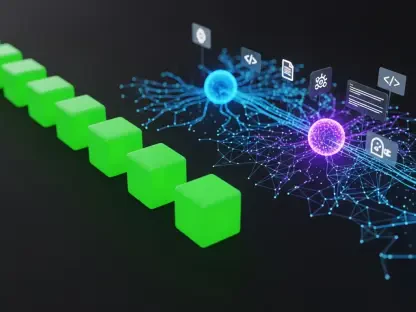In the fast-evolving landscape of software development, automation and artificial intelligence are becoming indispensable tools for streamlining complex workflows and boosting productivity, and Google has taken a significant leap forward with the introduction of Gemini CLI GitHub Actions. This groundbreaking integration embeds AI-driven coding capabilities directly into GitHub repositories, promising to redefine how developers collaborate, manage issues, and review code by transforming Gemini from a simple terminal-based assistant into a dynamic, repository-level teammate. Built on GitHub’s robust workflow automation framework, this integration offers a seamless way to tackle repetitive tasks, allowing teams to focus on innovation rather than routine maintenance. As development cycles grow shorter and more collaborative, understanding the impact of such advancements is critical for staying competitive. This article delves into the key features, setup processes, and security measures of Gemini CLI, highlighting its potential to reshape modern development practices.
1. Unveiling Gemini CLI GitHub Actions
Gemini CLI GitHub Actions marks a pivotal moment in the integration of artificial intelligence within collaborative coding environments. Launched by Google, this tool enables developers to harness Gemini’s advanced AI capabilities directly within their GitHub repositories, moving beyond traditional terminal-based usage. By leveraging GitHub’s workflow automation system, Gemini evolves into a virtual team member, capable of assisting with critical tasks such as issue triage, pull request reviews, and repository maintenance. This shift from a standalone tool to a collaborative asset means that repetitive and time-consuming processes can be handled efficiently, freeing up developers to concentrate on more strategic aspects of their projects. The seamless embedding of AI into daily workflows represents a forward-thinking approach to tackling the challenges of modern software development, where speed and precision are paramount.
The significance of Gemini CLI GitHub Actions lies in its ability to bridge individual and team-based development efforts. Unlike earlier iterations limited to local machines, this integration facilitates repository-wide automation, ensuring that every team member benefits from AI assistance. Whether it’s sorting through incoming issues or providing initial feedback on code changes, Gemini acts as a first line of support, reducing manual workload. This capability is particularly valuable for teams managing large-scale projects with numerous contributors, where maintaining consistency and oversight can be daunting. By embedding such intelligence directly into GitHub, Google has created a platform that not only enhances productivity but also fosters a more cohesive and responsive development environment, setting a new standard for AI-driven collaboration.
2. Standing Out Against GitHub Copilot
One of the most striking features of Gemini CLI GitHub Actions is its accessibility, especially when compared to alternatives like Microsoft’s GitHub Copilot. While Copilot often requires a paid subscription to unlock advanced functionalities, Google’s offering stands out by being entirely free of charge. This cost-free model is a game-changer for open-source developers, small teams, and even enterprises looking to integrate AI into their workflows without incurring additional licensing fees. The absence of financial barriers democratizes access to cutting-edge technology, enabling a wider range of developers to experiment with and benefit from AI-driven automation. This approach reflects a broader trend in the industry toward making powerful tools available to all, regardless of budget constraints.
Beyond affordability, the implications of Gemini CLI’s free integration extend to fostering innovation across diverse development communities. For smaller teams or individual contributors, the ability to leverage sophisticated AI without overhead costs means they can compete on a more level playing field with larger organizations. Enterprises, meanwhile, can scale AI adoption across multiple projects without worrying about escalating expenses. This contrasts sharply with subscription-based models that might limit usage or require constant budget evaluations. By removing these hurdles, Gemini CLI empowers a broader spectrum of users to enhance their GitHub workflows, potentially leading to faster iterations and higher-quality code. The emphasis on inclusivity through cost-free access positions this tool as a catalyst for widespread adoption and experimentation in software development.
3. From Terminal Roots to Repository Powerhouse
Gemini CLI initially emerged as a command-line interface, connecting developers to the robust Gemini 2.5 Pro model with an impressive one-million-token context window and open-source licensing tailored for local workflows. This early version provided a solid foundation for developers seeking AI assistance directly from their terminals, streamlining individual coding tasks with powerful contextual understanding. The focus on local usage ensured that developers could integrate AI into their daily routines without needing extensive setup or external dependencies. This initial release laid the groundwork for what would become a more expansive and collaborative tool, demonstrating Google’s commitment to enhancing developer efficiency through accessible technology.
With the introduction of GitHub Actions integration, Gemini CLI has transcended its terminal-only origins to support team-oriented environments. Now, it contributes to repository-level automation, playing an active role in processes like code reviews, issue management, and continuous integration. This evolution means that tasks once handled manually or through disparate tools can now be unified under a single AI-driven system, significantly reducing the time required for deployments. Teams benefit from consistent assistance across their projects, ensuring that no detail is overlooked during critical development phases. The transition to a collaborative framework highlights how AI can scale from individual support to enhancing group dynamics, offering a glimpse into the future of integrated development tools.
4. Key Functionalities Driving Workflow Efficiency
Gemini CLI GitHub Actions introduces a suite of powerful features designed to optimize development processes, starting with automated issue triage. This functionality allows new issues to be automatically labeled, categorized, and prioritized, drastically cutting down the time maintainers spend on backlog management. Instead of sifting through endless tickets, teams can direct their attention to resolving critical bugs or implementing key features. This automation ensures that repositories remain organized even under high volumes of activity, providing a structured approach to issue resolution. The reduction in manual oversight not only boosts efficiency but also minimizes the risk of important tasks slipping through the cracks, a common challenge in fast-paced projects.
Another standout capability is AI-powered pull request reviews, where Gemini evaluates code changes before human reviewers step in. It checks for adherence to style guidelines, identifies potential bugs, and verifies correctness, allowing maintainers to focus on broader design considerations rather than surface-level errors. This pre-review process saves significant time and effort, ensuring that human input is reserved for complex decision-making. Additionally, Gemini supports on-demand collaboration through GitHub comments, where developers can trigger specific actions by mentioning @gemini-cli with commands like /review or /triage. This conversational interaction mimics real-time team collaboration, making AI a seamless part of the workflow. Together, these features create a robust system for managing and refining code with minimal friction.
5. Simplifying Setup and Configuration
Setting up Gemini CLI GitHub Actions is designed to be straightforward, ensuring developers can quickly integrate it into their repositories. The process begins with ensuring Gemini CLI version 0.1.18 or higher is installed, followed by running the /setup-github command within the CLI. This action automatically generates the necessary workflow files under .github/workflows and handles configuration settings, reducing the technical burden on users. Authentication options cater to different needs: developers can store a GEMINI_API_KEY in GitHub Secrets for a simple setup suitable for most individual or team projects, while enterprises can opt for Workload Identity Federation (WIF) using short-lived federated tokens for enhanced security in CI/CD pipelines. This flexibility ensures accessibility for various user groups.
Customization further enhances Gemini CLI’s adaptability to specific project requirements. By placing a GEMINI.md file in the repository, teams can define coding guidelines, include documentation links, or set project-specific rules that Gemini uses to tailor its responses and reviews. This level of personalization ensures that the AI aligns with unique team standards, making its contributions more relevant and actionable. The combination of easy setup, diverse authentication methods, and customizable behavior lowers the barrier to entry for adopting AI in GitHub workflows. Developers can swiftly move from installation to active use, integrating Gemini into their processes without extensive reconfiguration or learning curves, thereby maximizing the tool’s immediate impact on productivity.
6. Prioritizing Security in AI Integration
Security remains a cornerstone of Gemini CLI GitHub Actions, addressing concerns about integrating AI into sensitive development environments. Commands executed by the model are confined to isolated environments using sandboxing technologies such as Docker, Podman, and macOS Seatbelt, minimizing risks of unauthorized access or unintended actions. Since version 0.1.14, all executions are meticulously logged for auditability, providing transparency and accountability. Commands flagged as unusual or potentially unsafe require explicit developer confirmation before proceeding, adding an extra layer of protection. These measures ensure that the integration of AI does not compromise the integrity of repositories or workflows, a critical consideration for production settings.
For heightened security, Google strongly recommends using Workload Identity Federation (WIF) authentication in production environments to avoid vulnerabilities associated with static API keys. This approach aligns with modern best practices for CI/CD pipelines, using short-lived tokens to reduce exposure risks. By combining isolated execution, detailed logging, and secure authentication options, Gemini CLI establishes a robust security model that instills confidence in its deployment across diverse projects. Teams can leverage AI assistance without sacrificing safety, ensuring that innovation and protection go hand in hand. This focus on safeguarding workflows underscores the tool’s readiness for enterprise adoption, where security standards are non-negotiable.
7. Demonstrating Practical Workflow Automation
A practical example of Gemini CLI’s capabilities is evident in a minimal YAML configuration named “Gemini Pull Request Review,” designed to automate the evaluation of pull requests. This workflow triggers Gemini to analyze every new or updated pull request before merging, ensuring consistent scrutiny across the repository. Running on ubuntu-latest, it incorporates actions/checkout@v4 and google-github-actions/run-gemini-cli@v0.1, with arguments set to review files comprehensively. The process is secured by storing a GEMINI_API_KEY in GitHub Secrets, maintaining confidentiality and control. This setup exemplifies how automation can be seamlessly integrated into existing GitHub processes, providing immediate value through structured and reliable code assessments.
The impact of such a workflow lies in its ability to standardize and expedite pull request reviews, a critical component of collaborative development. By having Gemini perform initial checks, teams ensure that basic errors are caught early, allowing human reviewers to dedicate their expertise to nuanced feedback. This not only accelerates the review cycle but also enhances code quality by layering AI and human oversight. The simplicity of the YAML configuration means that even teams with limited automation experience can adopt this approach, embedding AI into their daily operations with minimal effort. Such practical applications highlight Gemini CLI’s role in transforming abstract AI potential into tangible workflow improvements, paving the way for broader adoption.
8. Reflecting on a Milestone in AI-Driven Development
Looking back, Gemini CLI GitHub Actions emerged as a landmark achievement in Google’s mission to weave artificial intelligence into the fabric of collaborative software development. Its rollout demonstrated a clear vision for enhancing productivity through free access, adaptable configurations, and stringent security protocols. This tool successfully lowered the barriers for teams of all sizes to experiment with AI-driven automation within their GitHub repositories, setting a precedent for accessible innovation. The seamless integration into existing workflows proved that AI could be both powerful and practical, reshaping how developers approached routine tasks and complex challenges alike.
Moving forward, the focus should shift to exploring how Gemini CLI can evolve with emerging development needs, potentially integrating with other platforms or expanding its feature set to address niche use cases. Teams are encouraged to experiment with custom configurations to maximize its benefits, tailoring the tool to specific project demands. Additionally, staying updated on security enhancements will be crucial to maintaining trust in AI integrations. As the landscape of software development continues to advance, leveraging tools like Gemini CLI will be key to staying agile, ensuring that automation remains a catalyst for creativity and efficiency in coding environments.









